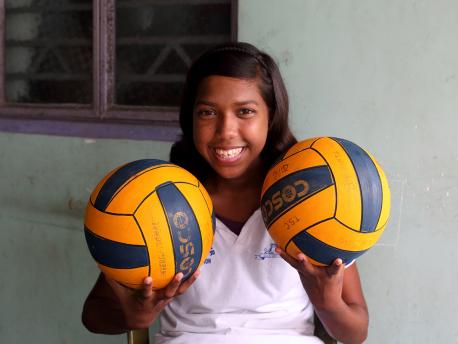
As the Games Begin, the Olympic Spirit Is Strong in These Children
Few, if any, events bring the world together like the Olympics.
With more than 200 countries qualifying in this year’s Summer Games, there will likely be numerous jaw-dropping feats and emotional moments in the weeks ahead. But after a year-long delay due to the pandemic, there also remains a great deal of uncertainty in Tokyo. At the beginning of July, it was announced that no spectators would be allowed at this year’s Olympics, and since then a number of athletes have tested positive for COVID-19. It’s still unclear exactly how things will play out.
In many ways, these Olympics are completely unique — but if there’s one thing that remains constant, it’s the transformative power of sports. For children around the world watching in their communities, the Olympics are a reminder of how we can put aside our differences and find joy together in play. In UNICEF’s global work, it’s not uncommon to hear from children how they found their confidence at the soccer field, basketball court or swimming pool.
A 2019 report from UNICEF and the Barça Foundation shows that what children learn through sports can often be beneficial in the classroom and beyond: “Participation […] improves children’s educational attainment and skills development including empowerment, leadership and self-esteem – contributing to their overall well-being and future prospects.” With this in mind, here are a few young athletes who embody the spirit of the Olympics and exemplify what Sports for Development are all about.

16-year-old Daniel has a relentless passion for basketball. Although basketball programs in Juba, South Sudan were paused due to COVID-19 safety restrictions, he insists on playing even if that means doing so alone. Daniel is staying positive, establishing a schedule and keeping up with his exercise. “You just gotta keep pushing right now,” he says.

“We are strong and we believe that in Afghanistan, nothing is impossible.” This is the Herat girls cricket team’s message to the world. As these young athletes compete together, they are sending a positive message to all girls in their country. And many continue to inspire as they get older, like Nafiza, the captain of the cricket team representing the Herat Women Cricket Club, who hopes to see a national women’s team someday compete on the world stage.

Allen, 13, shows off his tennis racket while standing on a fishing boat in the small bay behind his family’s house in the Philippines. He and other children in his village were first introduced to tennis three years ago by a friend of the family. “I like tennis because I am good at it. And I can go to many different places to play and meet new friends,” he says. “I like when I win, especially if there’s any prize money in the tournament.”

12-year-old Noyon from Bangladesh feels alive when running down the pitch: “I can protect myself from child marriage only by playing soccer and completing my education." In 2018, UNICEF and the Bangladesh Football Federation (BFF) partnered together to empower girls through sports and prevent child marriage. Due to COVID-19 delays, the federation were required to postpone a nationwide soccer talent scouting session consisting of girls ages 12 to 16, which was eventually held earlier this year.

Sports can often be a lifeline for children in emergencies. In Bamako, Mali, table tennis provides a welcome bit of fun for this group of boys at a temporary shelter opened by UNICEF and partners. The shelter has provided support to children living in the street during the COVID-19 pandemic, including both recreational activities and necessities like soap and safe water. “I feel safe here, and I’ve made a lot of friends,” says 13-year-old Samba, pictured above wearing white in the center.

At the Za’atari refugee camp in Jordan, this young girl and her soccer teammates are fighting stereotypes and toxicity in their community. “Some families here have an old way of thinking. They make us feel shame when we play soccer,” she says. “I used to feel nervous and shy to play, but now I feel confident as my friends and my coach encouraged me.”
After receiving new soccer equipment at the Za’atari Refugee Camp in Jordan, all girls and boys have the equal opportunity to practice the sport they love.
You can help UNICEF foster children’s love of sports throughout the world. Check out UNICEF Inspired Gifts like basketballs and soccer balls.
Photo credits, from top: 15-year old Roshni Parvin loves to play basketball and swim. She is a water polo player from West Bengal, India. © UNICEF/UN0331492/Das. South Sudan © UNICEF/UNI336478/Wilson. Afghanistan © UNICEF/UNI309883// Frank Dejongh. Philippines © UNICEF/UNI358470/Hogsholt. Bangladesh © UNICEF/UN0482162/Satu. South Sudan © UNICEF/UNI332889/Dicko. Jordan © UNICEF/UN0343757/AlHattab.
HOW TO HELP
There are many ways to make a difference
War, famine, poverty, natural disasters — threats to the world's children keep coming. But UNICEF won't stop working to keep children healthy and safe.
UNICEF works in over 190 countries and territories — more places than any other children's organization. UNICEF has the world's largest humanitarian warehouse and, when disaster strikes, can get supplies almost anywhere within 72 hours. Constantly innovating, always advocating for a better world for children, UNICEF works to ensure that every child can grow up healthy, educated, protected and respected.
Would you like to help give all children the opportunity to reach their full potential? There are many ways to get involved.



